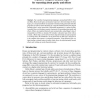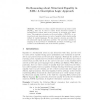1634 search results - page 22 / 327 » Reasoning about Knowledge Using Rough Sets |
ECAI
2000
Springer
13 years 11 months ago
2000
Springer
Abstract. Representing and reasoning about orientation information is an important aspect of qualitative spatial reasoning. We present a novel approach for dealing with intrinsic o...
RSCTC
1993
Springer
13 years 11 months ago
1993
Springer
This paper focuses on the application of rough set constructs to inductive learning from a database. A design guideline is suggested, which provides users the option to choose app...
FUIN
2007
13 years 7 months ago
2007
Abstract. Approximate Petri nets (AP-nets) can be used for the knowledge representation and approximate reasoning. The AP-net model is defined on the basis of the rough set approa...
FASE
2008
Springer
13 years 9 months ago
2008
Springer
For a number of programming languages, among them Eiffel, C, Java and Ruby, Hoare-style logics and dynamic logics have been developed. In these logics, pre- and postconditions are ...
ICDT
2003
ACM
14 years 27 days ago
2003
ACM
We define a boolean complete description logic dialect called DLFDreg that can be used to reason about structural equality in semistructured ordered data in the presence of docume...


